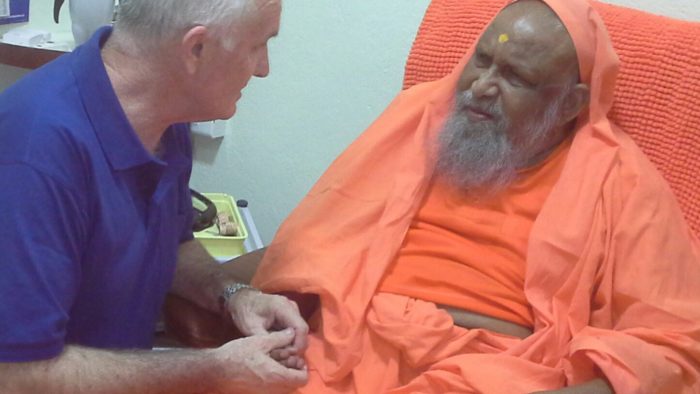Bede Clifford has a background in Western psychology, philosophy, theology and comparative religion . He has a Master of Applied Science and had formal training in various forms of Western psychotherapy.
He runs a blog which has as its subject matter "Dayananda Psychology" vedantaindailyliving.org.
In this interview with CSP, he talks about what he has learnt at the feet of Pujya Swami Dayananda:
You are a Westerner who spent 14 months studying with Pujya Swami Dayananda. What made you interested in going to India to study with him in the first place?
Bede: I did not go to Swamiji to study the religion of Hinduism or adopt the Hindu culture. It is my view that Hinduism is not only a religion but also a culture. As such, it can only be understood and appreciated in any real way from the inside. I am imbued with the Western culture in which I was brought up. It was not his religion that attracted me to him; rather, it was his understanding of human suffering and its resolution that captivated me.
You have a background in Western psychology, philosophy and theology. You have a Master of Applied Science and had formal training in various forms of Western psychotherapy. Was it because of this background that you found Swamiji’s teaching about human suffering and its resolution so interesting?
Bede: No. I went to him to resolve the psychological issues that I had been struggling with all my life. I went to India for personal reasons, not academic ones.
Western psychology has been very good at articulating the various forms of psychological suffering that keep recurring in our lives but, in my opinion, it has failed to bring about a lasting resolution of this suffering.
I had read all Swamiji’s basic books and saw that, even though he dealt with all the same issues Western psychologists had grappled with for over a century, his take on these issues was markedly different. I too had grappled with these very same problems as they existed in me as well as in my psychotherapy clients. However, all the efforts directed at myself and others to find a solution did not uncover the real problem that we struggle with us as human beings, let alone how to resolve it.
Whereas Swamiji seemed to have a very clear understanding of what afflicts us as human beings he, more importantly, clarified the means of resolving this problem. This is, first of all, knowledge or wisdom and then the living embodiment of that wisdom in daily life.
I did not go to India to study a subject called ‘Vedanta’ but, rather, to explore this fundamental problem as expounded by Swamji insofar as it affected my life; and in the hope of learning how to finally resolve it.
I had read enough of his books to know that he was the most extraordinary psychological thinker I had ever come across. There was no doubt in my mind that he was a genius. I did not come to him as a cool, calm and collected person because I was very far from being that. Rather, I approached him as a human being suffering from the universal problem that he had so clearly articulated and thus was very interested in learning how to go about overcoming it.
Swami Dayananda says that Vedanta has two subject matters: Self-knowledge and Self-growth. Vedanta proper deals with Self-knowledge. His teaching on Self-growth addresses the psychological transformation that he sees as necessary to understanding fully the Upanishadic vision.
It was this psychological transformation, that he suggested as the solution for a confused and unhappy person like me, that I found so compelling. It was for this reason that I went to India.
So you had a very definite aim in mind when you went to India to study with him?
Bede: Yes, I went to India to learn Dayananda’s psychology—and to study myself in light of it—so that I could resolve the suffering to which I had been subject all my life. Regarding his account of the workings of our minds, Swamiji did not elucidate a psychological theory but, rather, revealed what our psychology actually is.
Did you receive from Swamiji what you had hoped to receive?
Bede: Yes I did and then some!
He enabled me to look at my confused and troubled life in a clear and undistorted way. It would take a number of books to cover what I learnt from him. But for the purposes of this interview, I will give some practical examples of how the vision he imparted to me can really make a difference in our lives; particularly in resolving this fundamental problem from which, in his view, we all suffer.
 So what example would you like to start with?
So what example would you like to start with?
Bede: I think I will start with Swamji’s suggestion for facing every experience we are having, based on his vision of what the universe is.
For Swami Dayananda, Being itself is God and everything we are experiencing is the presence of Being manifesting itself in a particular form. This means that the presence of God pervades every aspect of our life in this world. This of course does not mean that we are consciously aware of this presence but the point he was making was that, no matter how it might seem, God is abidingly present. This struck me as quite a wonderful insight.
The example he always gave was of a clay pot. He would repeat again and again that there was no such thing as a ‘pot’; there was only the presence of clay in the form of a pot. There were not two entities - ‘clay’ and ‘ pot’; there was only the presence of clay in the form of a pot. The pot was an appearance that did not have its own being; in other words, it was entirely dependent on clay for its existence.
The life and being of the pot is clay. Similarly, the life and being we are is God, not the psycho-physical processes that we take ourselves to be. Normally, our sense of identity is rooted in and arises from these processes rather than being rooted in God and arising from the life and being that is God.
The implications of this was that the presence of everything in front of me is God. He said that if, in the act of prayer, we raise our eyes upwards, we have failed to see what is in front of us. He did not talk about belief in God but rather disclosed God as a fact to be appreciated. He once said a rather profound thing: “The way to invite God into our life was by being aware of Him.
So what does he say about how to become aware of the presence of God as a fact to be appreciated?
Bede: You bring up a very interesting point. Swamiji said that “You can only see what you know”. This means that if we don’t know what God is, we can’t see or be aware of him.
Now this is what was so interesting about him. He did not bring a theory about what God is. Rather, he would use words to unfold a meaning in order to provoke a recognition (knowledge) of what God is so that a door may be opened to an actual awareness of God’s presence.
He was not giving us a belief or a philosophical certainty that God exists but the conscious realization of God’s presence which alone is the transformative factor. It turns out that, to abide in the appreciation of the presence of God, is to be transformed psychologically as an individual.
This has nothing to do with the idea that, one day in the future, we will discover what God is but that right here, right now, as we are, we can be rooted in Being or, as Swamiji put it, “relaxed in the lap of Isvara”.
Would you mind going into a bit more about what brought about this recognition of what God is that allows us to be aware of his presence?
Bede: This is a little hard to explain so what I will do is describe it. As I already mentioned, he was not giving us a lecture about Indian Philosophy because his approach to Vedanta was anything but scholastic.
He was a person who unfolded the vision of God in his teaching while fully living it. It was quite extraordinary and I had never seen anything like it. He created a ‘word mirror’ in which the recognition of what God is took place; we found ourselves seeing as he was seeing. This recognition made the awareness of God’s presence available to us, from this point on, whenever we turned to it.
It needs to be stressed that, if we don’t know what God is in the sense that Swami Dayananda means it, the awareness of God’s presence in our lives is not possible. Our range of cognition or seeing will remain enclosed within our physical senses and mental processes.
So, could you discuss what Swamiji means by “being relaxed in the lap of Isvara” and why you think this is so significant?
Bede: This is where it got very interesting for me with my background in psychological studies.
In the West, we have all these different categories that cover human unhappiness: depression, anxiety, anger, and inferiority to a name a few. Also, there are various approaches to dealing with these various complaints.
Swami Dayananda on the other hand boiled down all forms of suffering to a universal problem centred on our fear (hence the compulsiveness of human life) and self-dissatisfaction (“I hate being the way I am”). This problem is not located in the mind. Swamiji points out that the mind never says “I am upset”; only we say this. This is an extraordinary fact on which a whole book could be written and is akin to a ‘Copernican’ revolution, psychologically speaking. In fact, this profound insight clearly shows why Western psychology does not really work. In the right hands, it can of course improve our ‘functional’ existence but it has failed to deliver real transformation in our lives. It is too big a subject to go into in this interview but I just wanted to point it out.
All human suffering involves hating the way we are and, because we take our real life to be the mind-sense-body complex, the fear of being harmed or annihilated is constantly present.
So here we have this universal problem centred on ourselves. The great thing Swamji allows us to see is that the solution is also located right here, right now, as we are. The way this works is that, when we are relaxed in God’s lap, three things become very discernible.
First of all, we are composed. This composure does not take place in our minds but rather we find ourselves being composed. This means that every aspect of ourselves participates in this composure. In this composure we cease to be a fearful person; we, in fact, disappear as a fearful person. So here we have a sense of composure that is abidingly present that does not depend on the presence or absence of objects. Rather, it arises from our being rooted in Being or God or Isvara. The name does not matter; what’s important is a way of being in the world that is free from fear.
The second fact that becomes discernible, when we are resting in the lap of Isvara, is the real meaning of freedom. Normally, things happen and we chop and change psychologically depending on external occurrences. We become angry, then sad, then bored as determined by what is occurring in front of us. In such a condition, there is no sameness and our way of being is completely held captive by what is happening around us. We are then like a puppet whose strings are being pulled by something external. This is not freedom.
However, when we learn the value of being relaxed in God’s lap, we are able to remain stable and unmoved in the face of changing appearances, even unpleasant ones. This is not merely an idea of freedom but a real taste of what it means to be free while living, which is the goal of Vedanta. In fact, Karma Yoga—which Swamiji referred to as “sameness”—is the practice of being psychologically free while living; not absolute freedom but relative freedom.
Thirdly, when we are relaxed in Isvara’s lap we are at home in God and to be at home in God is to be at home with ourselves. Being at home with ourselves depends on GOD. Self-acceptance is not something we can ‘do’ but rather it is what we discover when we find ourselves being relaxed in Isvara’s lap.
I might mention here another one of Swamiji’s psychological gems. The basis of self-acceptance is the understanding of Isvara. So, guess what happens to any kind of self-dissatisfaction if we right here, right now as we are shift into Isvara’s lap? We are lifted up and out of every form of self-dissatisfaction because we feel at home with ourselves and are not hankering to be different from what we actually are.
You can see from this how Swamji shows us the resolution of all forms of self-dissatisfaction and fear to which we are all prone. His teaching not only reveals the location of the problem but also points out the only ‘place’ where the resolution of this problem is possible.
I can’t express the gratitude I feel for having been released from the burden of seeking solutions to my suffering in all the wrong places.
Swamiji has a beautiful way of expressing this. He says that our problem is that we are full of ourselves instead of being full of God. There needs to be less of us and more of Isvara. When we are enclosed in our reactions and our sense of identity becomes dependent on our psycho-physical functioning, fear and self-dissatisfaction are the inevitable result. To the extent that limit ourselves to being a psycho-physical entity, we can’t help but seek refuge in the world of changing appearances. There is nothing eternal in such a world and our destiny on these terms is old age, sickness and death. In other words, our only real refuge is God.
So what you are saying is that, without the understanding of God as unfolded by Swamiji, there is no psychological transformation in a real sense. We remain fearful, determined and self-dissatisfied.
Bede: Yes. Swamji gave a series of talks that lasted for about four weeks. The main point he made was that, given we are cut off from Reality, we cannot help but be miserable. Our misery is just the lawful result of being alienated from God. This is our only problem. I went to see him during this time and asked him “You don’t see pathology do you?” to which he replied “No. There is only order”.
Up till that point, I believed that I suffered from psychological problems but, after he illuminated the truth of the matter for me, that belief disappeared. Now I know that the only thing I suffer from is being cut off from the Life, Light and Fullness (the English vernacular for Sat, Chit and Ananda ) that is God. Now any form of upset I experience, which happens often, is an instruction to take refuge in God.
So, when in India, you discovered what Swami Dayananda means by God as well as the psychological transformation that results from abiding in the appreciation of God’s presence, resting in God’s lap. Is this all that is required? Just to come to this knowledge and then it is all done?
Bede: Absolutely not! It is only the beginning.
Swami Dayananda made it very clear that two things are necessary to transform our lives. Wisdom, which in this case is the recognition that opens our eyes to God’s presence and, secondly, the living of this wisdom in our daily life. Without living the wisdom on a moment-by-moment basis, it will not be established in us in any meaningful way.
Once you understand that all emotional upsets are the result of falling away from the lap of Isvara, the practice of Karma Yoga begins. As Swamiji often remarked “There is no karma yoga without Isvara”.
With this wisdom, we are clear on the fact that the meaning of ALL our different forms of suffering is not being at home in God. We also understand that we disappear as a suffering person when resting in the lap of Isvara. This means that we don’t have to fix ourselves psychologically; rather, the action of God’s presence appreciated does this for us.
By the time I left India, this had become very clear to me. But I did not leave entirely free of being under the sway of what Swamiji called ‘binding desires’ and being at home with myself was not well established. I had a lot more work to do and I knew it.
However, my life now consisted of learning to recognise when I fell away from Isvara’s lap which I did all the time. When I cease living in Isvara’s world, I become enclosed in my own world. I become full of myself. Swamji called this “losing ourselves”. I could see that my daily life consisted of losing myself in the face of unpleasant or disagreeable events. My practice now is that every time I see that I have moved away from the lap, I consciously shift back to being at home in God. Is this easy? No. Sometimes it takes me a while to come back especially if I am shaken. As Swamiji observed that Karma Yoga is akin to wobbling back like a Chinese doll that has been knocked over. At the beginning, I did a lot of wobbling. I still do but not as much.
For the past four years since leaving India, my practice has been learning how to remain the same (abiding in the lap of Isvara) in the face of changing appearances. The practice of living this vison of God is what changes us psychologically at our very core. I have found these changes remarkable and somewhat surprising. My binding desires are not as insistent. A disposition towards remaining with myself, as I am, is appearing more and more. This has also been the experience of Western people with whom I have shared this vision.
India was only the beginning. Once the vision of God opens up to us and we remove our confusions and doubts about it, we need to test this vision in the market place. We must learn to remain the same in the face of all the different psychological reactions that can become active in us. We also need to learn to remain composed and stable in the face of what people say and do. Also, when faced with difficult circumstances we need to learn how to face these conditions without resistence. We can only do this by abiding in the attitude of graceful acceptance which is the attitude that is born of the vision of God that Swamiji unfolds for us.
Is this practice of Karma yoga easy? No. It’s simple but not easy. However, it changes us psycho-dynamically. If our conscious and unconscious binding desires are not neutralised, the psychological basis of our life remains the same. Without the discovery of a contemplative disposition, it is not possible to abide in a peace that lifts us beyond our enclosure in different forms of emotional disturbance.
Am I now a wonderful human being who is always under the sway of a desire to be loving and caring? Absolutely not! Have I arrived at the point of wanting to do what I need to do. A lot more of the time yes but definitely not always. I am a Karma Yogi. I am still learning about being full of the presence of God instead of being full of myself. My egocentricity is tenacious to say the least.
The psychology of the Gita is a most remarkable thing. Swami Dayananda unveiled this psychology in a way that made it accessible to secular Westerners like me. This I found to be truly remarkable.
Why do you say that Swami Dayananda is the Shankara for the West?
Bede: I am not a Hindu and do not belong to the Indian culture. I don’t practice Hindu religious forms. So what did Swami Dayananda give me? Simple.
He revealed the Vedic vision of God and helped me learn how to adopt a lifestyle in which this vision can be lived by secularised Westerners like myself. I don’t know of any other Indian teacher who has done this in the way that he was able to do.
This vision is universal and Swamji made it available to all of us regardless of who we were or of what religion or culture we happened to belong to.
I loved Him. He was very kind to me. He respected our cultural differences and he led me into a living appreciation of the presence of God. He did not look down on me for being a Westerner but rather related to me a human being.
He was truly a universal teacher. A brilliant mind. A loving heart. He was the ‘real deal’ as a guru. He dispelled my fundamental darkness of ignorance and reconnected me with God.





